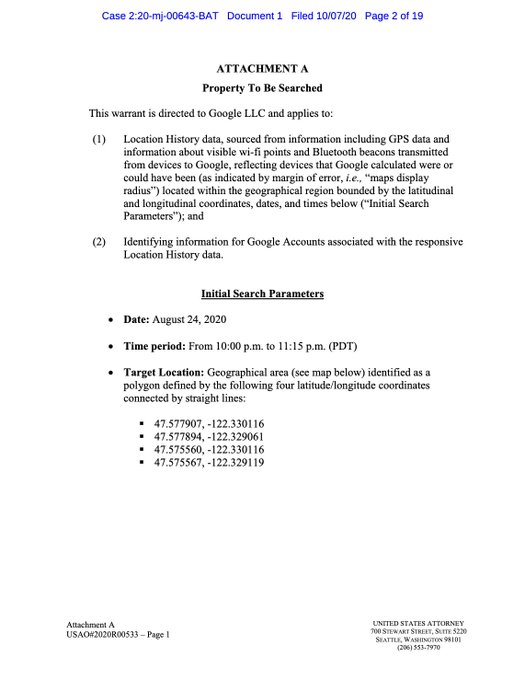Google collects data on users that could be used to prosecute them if abortion becomes a crime
More
than 40 civil rights groups on June 2 warned that Google's practice of
collecting and storing the location data of its customers is likely to endanger
people who seek abortion care if the U.S. Supreme Court overturns Roe
v. Wade, as it's expected to this summer, and demanded the company put
human rights ahead of its profit-driven marketing tools.Example of type of warrant that could be used
"Google's collection and storage of location data will make the company complicit in the criminalization of people seeking abortions in a post-Roe world," said the groups, including Fight for the Future, MediaJustice, and Amnesty International.
"The company must
immediately stop unnecessary collection and retention of our location
data."
In
a letter addressed to Google CEO Sundar Pichai, the organizations noted that
potential criminalization of abortion patients is hardly a hypothetical outcome
of the company's data collection, as "law enforcement officials routinely
obtain court orders forcing Google to turn over its customers' location
information."
"This
includes dragnet 'geofence' orders demanding data about everyone who was near a
particular location at a given time," the letter reads.To collect data like this
In
2020, the company received 11,554 geofence warrants from law enforcement
agencies, according to data published by Google.
Should Roe be overturned, as a leaked draft Supreme Court opinion last
month suggested it will be, prosecutors in more than two dozen states where
abortion would be banned without the ruling
in place could demand that Google share its data showing who visited abortion
clinics over a period of time.
"In a world in which abortion could be made illegal, Google's current practice of collecting and retaining extensive records of cell phone location data will allow it to become a tool for extremists looking to crack down on people seeking reproductive healthcare," said the groups.
The
organizations pointed out that other major tech companies including Apple do
not "retain the same quantity of customers' location data."
The
company's "surveillance capitalism business model," which it employs
in order to sell targeted ads, "has long undermined our right to
privacy," said Michael Kleinman, director of technology and human rights
for Amnesty International USA. "It's terrifying to consider how the massive
amounts of personal data gathered by Google and other companies can now be
weaponized against people seeking to exercise their reproductive rights."
The
groups' letter comes days after more than 40 Democratic lawmakers wrote to Pichai
about the issue, warning that Android users could become especially vulnerable
to Google's location data collection methods if Roe is
overturned because Android smartphones "collect and transmit location
information to Google, regardless of whether the phone is being used or which
app a user has open."
Shortly
after the draft opinion was leaked in May, location data firm SafeGraph
was forced to stop selling data about people
who visit abortion clinics after reporting on the company raised alarm.
To
protect its users, the groups said, Google must take the same steps as
SafeGraph.
"Google's
location data collection has always been a problem. Pairing this excessive
invasion of people's privacy with the likely future where the laws of our
country give the government control over people's bodies will endanger
millions," said Caitlin Seeley George, campaign director at Fight for the
Future.
"Google
must act quickly to change its practices to stop this unnecessary data dragnet
before it is complicit in the criminalization of abortions," George added.

